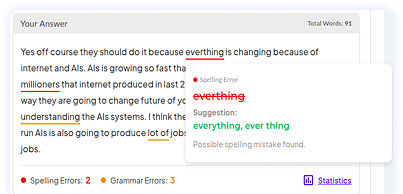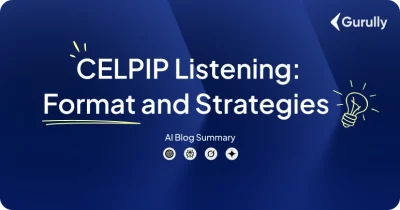Are your low CELPIP scores becoming a barrier to Canadian dreams? If yes, then this blog is the solution. Scoring high in this test is now only about knowing the grammar and format of the questions. It requires a strong vocabulary that will create a good impact on your responses. Whether it is the speaking section or the writing section, the ability to use good vocabulary in the response will surely help in scoring high. Here is a list of over 150 CELPIP vocabulary words that will help make your Canadian dream a reality.
In this CELPIP Vocabulary Guide, you will learn about essential word lists, usage tips, and strategies to help you expand your vocabulary and maximize your score.
Why CELPIP Vocabulary Matters?
In CELPIP, your ability to understand and use a wide range of words is constantly being tested:
- Listening Section: You will hear a variety of accents and vocabulary in everyday and workplace contexts. Knowing synonyms and idioms helps in choosing the correct answers.
- Reading Section: In this section, you will encounter texts that will have higher-level vocabulary, paraphrasing, and context-based meanings.
- Writing Section: While writing your response, using good CELPIP vocabulary for Writing helps in improving tone and clarity.
- Speaking Section: Using good CELPIP vocabulary for speaking enhances fluency. The more naturally and accurately you can use words, the higher your performance will be rated.
List of 150+ CELPIP Vocabulary Words:
Bookmark this list of vocabulary for CELPIP exam and use it while preparing for exam.
Transition Words:
| Connector | Type | Example |
| furthermore | Formal | Furthermore, the policy benefits all residents. |
| likewise | Formal | “Likewise, community involvement boosts well-being.” |
| nevertheless | Formal | “It was raining; nevertheless, we continued our hike.” |
| on top of that | Multi-word | “On top of that, the new system reduces costs.” |
| not only… but also | Complex | “Not only is it eco-friendly, but it’s also affordable.” |
| plus | Informal | “I studied hard, plus I attended extra workshops.” |
| for instance | Formal | “For instance, air pollution affects urban health.” |
| in addition | Formal | “In addition, new staff were hired.” |
| similarly | Formal | “Similarly, many cities adopted green energy policies.” |
| however | Formal | “However, this plan may cost more.” |
| in contrast | Formal | “In contrast, her plan saved time.” |
| as a result | Cause/Effect | “As a result, traffic was reduced.” |
| therefore | Cause/Effect | “Therefore, we must reconsider our budget.” |
| thus | Cause/Effect | “Thus, the results were invalid.” |
| meanwhile | Time | “Meanwhile, the team prepared the report.” |
| eventually | Time | “Eventually, we reached an agreement.” |
| to sum up | Conclusion | “To sum up, the plan is effective.” |
| lastly | Conclusion | “Lastly, I’d like to thank the team.” |
| although | Contrast | “Although it rained, we played outside.” |
| despite | Contrast | “Despite the delay, the task was completed.” |
| whereas | Advanced | “He prefers emails, whereas I like phone calls.” |
| due to | Reason | “Due to bad weather, the flight was cancelled. |
| since | Reason | “Since it’s late, let’s stop here.” |
| even though | Contrast | “Even though it was cold, she swam.” |
| although | Contrast | “Although tired, he kept working.” |
| instead of | Contrast | “Instead of tea, she had coffee.” |
| in conclusion | Conclusion | “In conclusion, the data supports our claim.” |
| to illustrate | Example | “To illustrate, Canada has diverse seasons.” |
| for example | Example | “For example, Vancouver has a mild climate.” |
| as well as | Addition | “She brought snacks as well as drinks.” |
| that being said | Contrast | “That being said, we must remain cautious.” |
| otherwise | Contrast | “Study hard, otherwise you may fail.” |
| thereby | Result | “He trained daily, thereby improving his stamina.” |
| notwithstanding | Contrast | “Notwithstanding her efforts, the deal failed.” |
| in other words | Clarification | “In other words, we need more time.” |
| to put it differently | Clarification | “To put it differently, we’re out of budget.” |
| as long as | Condition | “You can go out as long as you’re back by 9.” |
| provided that | Condition | “You may leave early provided that the work is done.” |
| by the time | Time | “By the time we arrived, it was too late.” |
| in the meantime | Time | “In the meantime, read Chapter 3.” |
| firstly | Sequence | “Firstly, gather all documents.” |
| secondly | Sequence | “Secondly, confirm the address.” |
Useful Idioms:
| Idiom | Meaning | Example |
| piece of cake | very easy | “The test was a piece of cake.” |
| under the weather | feeling unwell | “I felt under the weather yesterday.” |
| hit the nail on the head | exactly correct | “You hit the nail on the head.” |
| cost an arm and a leg | very expensive | “That phone cost an arm and a leg!” |
| time flies | time passes quickly | “Time flies during holidays.” |
| go the extra mile | make extra effort | “She always goes the extra mile.” |
| rule of thumb | general guideline | “A good rule of thumb is to save 10% monthly.” |
| burn the midnight oil | work late | “He burned the midnight oil to finish work.” |
| back to square one | start again | “We’re back to square one on the design.” |
| call it a day | stop working | “Let’s call it a day.” |
| bend over backwards | try very hard | “She bent over backwards to help him.” |
| hit the books | study hard | “I need to hit the books tonight.” |
| in hot water | in trouble | “He’s in hot water with his boss.” |
| keep an eye on | monitor | “Please keep an eye on the kids.” |
| on cloud nine | very happy | “He was on cloud nine after the results.” |
| spill the beans | reveal a secret | “He accidentally spilled the beans.” |
| once in a blue moon | very rarely | “She visits once in a blue moon.” |
| jump the gun | act too soon | “We jumped the gun with our announcement.” |
| let the cat out of the bag | reveal secret | “She let the cat out of the bag too early.” |
| break the ice | start a conversation | “Jokes help break the ice.” |
| a blessing in disguise | hidden good outcome | “Losing the job was a blessing in disguise.” |
| by the book | follow rules exactly | “He does everything by the book.” |
| cut corners | do something cheaply | “Don’t cut corners on safety.” |
| throw in the towel | give up | “He threw in the towel after failing twice.” |
| face the music | accept the consequences | “It’s time to face the music.” |
| once bitten, twice shy | cautious after bad experience | “I’m careful now—once bitten, twice shy.” |
| cold feet | hesitation | “She got cold feet before the wedding.” |
| have a lot on your plate | very busy | “I can’t help—I have a lot on my plate.” |
| in the same boat | same situation | “We’re all in the same boat.” |
| get the ball rolling | start something | “Let’s get the ball rolling on the project.” |
| easier said than done | hard to do | “Exercising daily is easier said than done.” |
| light at the end of the tunnel | hopeful sign | “There’s light at the end of the tunnel.” |
| get out of hand | become uncontrollable | “The situation got out of hand.” |
| miss the boat | miss an opportunity | “He missed the boat on early registration.” |
| make ends meet | manage finances | “She struggles to make ends meet.” |
| take for granted | not appreciate | “Don’t take your job for granted.” |
| jump on the bandwagon | follow a trend | “Everyone’s jumping on the AI bandwagon.” |
| zip your lip | keep quiet | “Zip your lip during the interview.” |
| keep your chin up | stay positive | “Keep your chin up despite the failure.” |
Synonyms:
| Word | Synonyms |
| good | excellent, outstanding, superb, exceptional |
| bad | poor, terrible, awful, dreadful |
| help | assist, aid, support, facilitate |
| show | display, demonstrate, exhibit, reveal |
| start | begin, commence, initiate, launch |
| end | finish, conclude, terminate, wrap up |
| easy | simple, effortless, straightforward, clear |
| hard | difficult, challenging, tough, demanding |
| say | state, declare, mention, express |
| tell | inform, notify, communicate, explain |
| think | consider, reflect, ponder, evaluate |
| big | large, huge, enormous, massive |
| small | tiny, little, petite, miniature |
| happy | joyful, delighted, content, pleased |
| sad | unhappy, miserable, sorrowful, downcast |
| smart | intelligent, clever, bright, sharp |
| fast | quick, rapid, speedy, swift |
| slow | gradual, sluggish, leisurely, delayed |
| important | crucial, vital, significant, essential |
| nice | pleasant, kind, friendly, agreeable |
| angry | mad, furious, irate, upset |
| afraid | scared, frightened, terrified, nervous |
| rich | wealthy, affluent, prosperous, well-off |
| poor | needy, impoverished, underprivileged, broke |
| idea | concept, notion, thought, suggestion |
| job | occupation, profession, career, position |
| tired | exhausted, fatigued, worn out, sleepy |
| funny | amusing, humorous, hilarious, witty |
| wrong | incorrect, mistaken, inaccurate, false |
| right | correct, accurate, proper, appropriate |
| neat | tidy, organized, clean, orderly |
| dirty | messy, filthy, soiled, unclean |
| lazy | idle, inactive, sluggish, lethargic |
| strong | powerful, sturdy, tough, resilient |
| weak | fragile, frail, feeble, powerless |
| think | contemplate, reflect, speculate, believe |
| answer | reply, respond, retort, acknowledge |
| talk | speak, converse, chat, communicate |
| get | receive, obtain, acquire, gain |
Vocabulary-Building Strategies
Below are the strategies that will help you in building a CELPIP vocabulary list to score high.
Read with Purpose:
Read Canadian news websites, blogs, and short stories. Try to highlight unfamiliar words, look them up, and try to use them in your own sentences.
Use Flashcards:
Practice by creating flashcards. Use flashcards that have definitions, synonyms, and example sentences. Tools like Anki or Quizlet can help with spaced repetition.
Practice Speaking with New Words:
One of the best way to include good vocabulary is by using it in daily conversation or speaking practice. It will help in memorizing long-term memory.
Watch and Listen:
Watch English shows, podcasts, and YouTube channels focused on Canadian culture or day-to-day life. Pay attention to how words are naturally used.
Make a Vocabulary Journal:
Try to write down all new words, meanings, and sample sentences in a notebook. Review this regularly to strengthen your word power.
Take advantage of Gurully’s free mock test with instant AI-scoring and start your preparation now. 
Common Mistakes to Avoid
Many test-takers fall into these traps while working on their vocabulary:
- Using big words incorrectly: It’s better to use simple, correct words than force complex ones that don’t fit the context.
- Overusing the same words: Repetition of basic vocabulary like “good,” “bad,” or “thing” can reduce your speaking/writing score. Try to vary your word choice.
- Neglecting collocations: Learning word combinations like “take responsibility” or “heavy rain” makes your language more natural.
- Ignoring word forms: Be aware of different forms (e.g., “analyze,” “analysis,” and “analytical”) to use them accurately in writing and speaking.
Building vocabulary is not just about theory—it requires regular, structured practice. That’s where Gurully comes in. At Gurully, we offer an all-in-one CELPIP preparation platform that enables learners to enhance their vocabulary through full-length mock tests. Gurully’s real-time exam simulation & AI-based feedback to highlight weak areas and suggest improvements
Conclusion:
Acing CELPIP vocabulary is a necessity to score high in the real exam. From transition words to idioms synonyms, every word plays a crucial role and enhances your score. Consistent practice, real-world application, and feedback-driven improvement are key.
With Gurully’s CELPIP Practice Test platform, you get structured guidance, real-time practice, and AI-powered insights to build and refine your vocabulary effectively. Start using the right words in the right way—and watch your CELPIP score rise!!
Along with CELPIP practice test, we also provide a PTE Mock Test to help you prepare effectively for the PTE Academic exam with real-time AI scoring.
FAQ
What is 34 out of 38 in CELPIP Listening?
How to score 9 each in CELPIP?
What are the connecting words for CELPIP?
How to improve CELPIP Speaking?
Is CELPIP harder than IELTS?
Also Read:
- CELPIP Writing Format Guide With Sample Question & Answer For 2025
- Understand CELPIP Speaking Test Task In Depth – Format & Sample Question With Answer
- Decoding the CELPIP Score Chart – Set Yourself Up for 2025 Success






